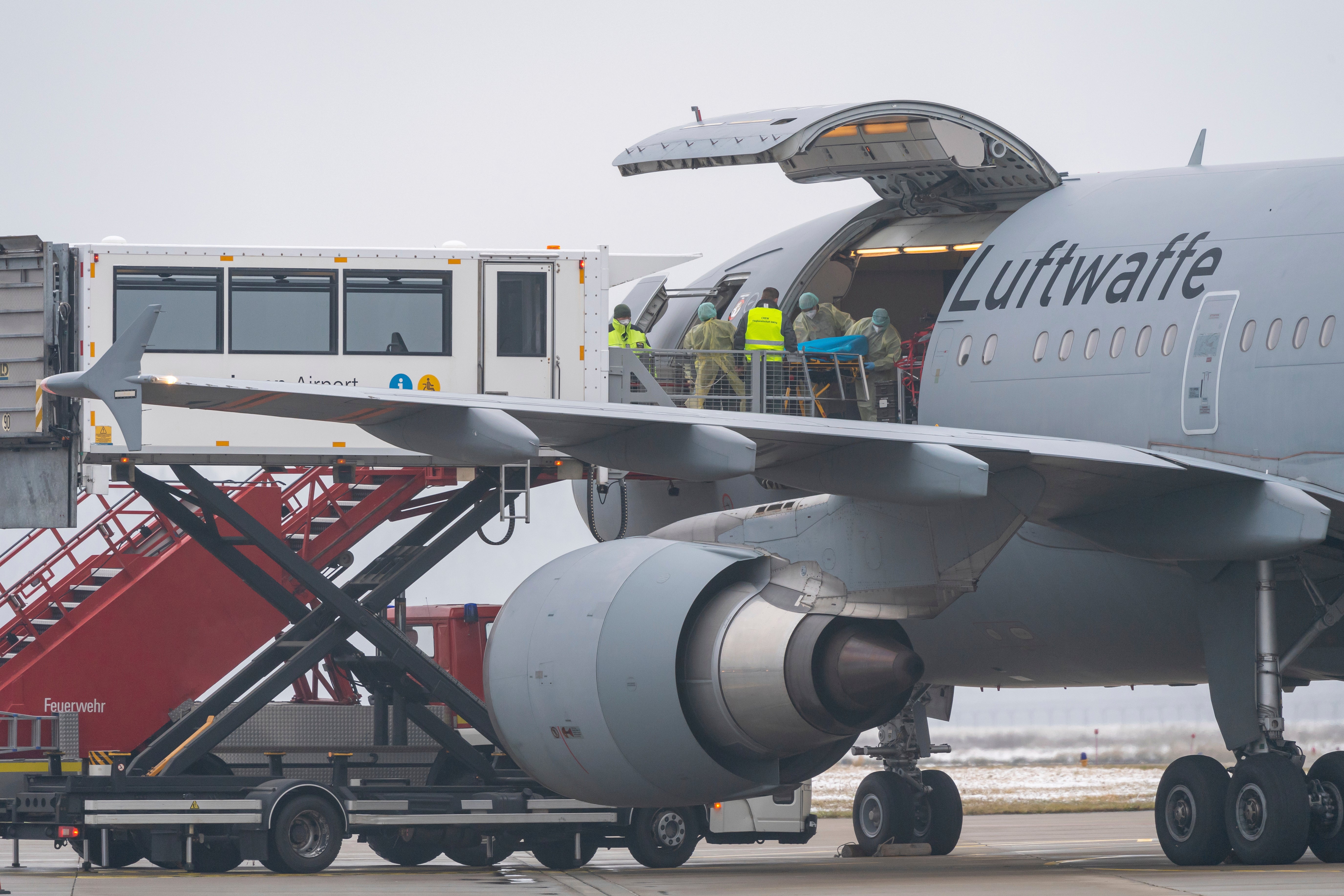German air force transfers Covid patients as hospitals run out of beds
Germany’s daily Covid-19 infections have hit a record high while the death toll has surpassed 100,000

Your support helps us to tell the story
From reproductive rights to climate change to Big Tech, The Independent is on the ground when the story is developing. Whether it's investigating the financials of Elon Musk's pro-Trump PAC or producing our latest documentary, 'The A Word', which shines a light on the American women fighting for reproductive rights, we know how important it is to parse out the facts from the messaging.
At such a critical moment in US history, we need reporters on the ground. Your donation allows us to keep sending journalists to speak to both sides of the story.
The Independent is trusted by Americans across the entire political spectrum. And unlike many other quality news outlets, we choose not to lock Americans out of our reporting and analysis with paywalls. We believe quality journalism should be available to everyone, paid for by those who can afford it.
Your support makes all the difference.Germany’s air force will help transfer Covid-19 patients from overwhelmed hospitals in the south as the government warned the pandemic is spiralling out of control with daily cases soaring to record levels.
A military medical evacuation aircraft was prepared to start airlifting seriously ill patients on Friday from hard-hit Bavaria to other hospitals in northern Germany where there is still capacity in intensive care units.
Germany’s daily new infections soared to a record-breaking 76,414 on Friday, up from 52,970 new infections per day a week ago.
Europe’s biggest economy has now passed the grim toll of 100,000 Covid-19 related deaths, with the government warning that the pandemic has become the country’s worst-ever health crisis and expressing concern over a new virus variant detected in South Africa.
“The situation is dramatic and grave,” said health minister Jens Spahn at a news conference in Berlin. “It’s worse than it’s ever been in this pandemic. We’ve got to do everything we can to relieve pressure on the health care system.”
Mr Spahn, whose time as minister will end next month once the new government takes office, scolded Germans for failing to reduce contact with others during this fourth wave and said people had previously been more conscientious and cooperative.
“We’ve got a lot of work to do on that,” he said.
The health minister also said the detection of the new Covid-19 variant, omicron, added to concern over rising infection numbers, and that the government would declare South Africa a “virus variant area” on Friday.
Covid-19 infections and death rates have soared in southern and eastern regions of Germany such as Bavaria and Saxony, where the vaccination uptake is lowest. This has overwhelmed hospital intensive care units and raised fears that doctors will soon have to resort to “triage” methods – focusing resources on those patients with a better chance of survival.
“It’s the most severe health crisis ever in Germany,” said Robert Habeck, the co-leader of the Green Party and incoming economy minister. “Time is running out. We’re seeing a doubling in the infection rates every 12 days. Hospitals are already full. We’ve only got a few days left.”
Annalena Baerbock, co-chief of the Greens and the country’s incoming foreign minister, told magazine DerSpiegel that neither a vaccine mandate for the whole population nor a new German lockdown could be ruled out.
While Germany dealt with the first waves of the pandemic relatively well compared to other European nations, its recent complacency during the election campaign and low vaccination rates have created a fertile ground for the sharp increase.
Germany’s vaccination rate, at 68 per cent, is among the lowest in western Europe.
The German military has played a low-key supporting role during the pandemic in recent months, with its duties, but the latest use of the air force is a significant development for the country.
The governor of Saxony, the state with the highest per capita infection rate in Germany, called for a meeting of federal and state officials planned for 9 December to be brought forward.
“Hesitancy will be punished,” Michael Kretschmer told German media group RND. “We need to scale down public and economic life as much as possible and provide financial help to affected companies,” he was quoted as saying.
In the meantime, Germany is releasing 18 million doses of vaccine over a 10-day period to meet demand for boosters and first shots for people who haven’t had any yet.
Additional reporting from AP
Join our commenting forum
Join thought-provoking conversations, follow other Independent readers and see their replies
Comments